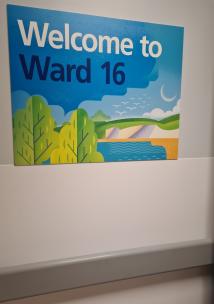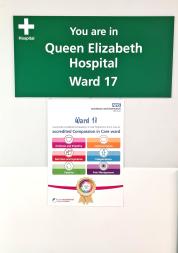Enter and View Report Ward 16, Queen Elizabeth Hospital

Ward 16 is the hospital’s dedicated trauma and orthopaedic ward, with 25 beds and two additional corridor beds used during periods of high demand. Most patients are admitted through A&E or the fracture clinic, with some transfers from other wards. While the average stay is 3 to 5 days, patients with complex or rehabilitation needs may remain longer.
Overall, the ward environment was clean, calm, and well-organised. Patients and families described the ward as welcoming, with high standards of cleanliness and good attention to patients’ dignity and comfort. Feedback about staff was largely positive. Staff were described as kind, approachable, and emotionally aware, with patients and families praising the way interactions went beyond just meeting clinical needs. Small gestures from staff, such as offering tea, accommodating visitors outside standard hours, or responding discreetly to personal care needs, were mentioned as making a big difference to patient wellbeing and trust in the care received.
Patients were also generally satisfied with food provision, with positive comments about meal variety, portion sizes, and quality. For some, mealtimes were described as a highlight of their day. However, a few patients noted that food could sometimes be bland or lukewarm, and that cultural preferences were not always accommodated.
Despite these strengths, several areas for improvement emerged. A key theme from our visits was the lack of proactive communication. Families reported feeling they had to take the initiative to seek updates and that the ability to be involved in care planning was often dependent on being physically present. Some described frustration with receiving limited or no updates, despite efforts to seek information. In other cases, families had adapted their routines—arriving early or staying beyond visiting hours to catch staff to ask questions or get updates.
The clarity of communication received was also a concern. While some staff communicated clearly, others were perceived as less approachable, and there were reports that communication quality could vary depending on individual staff members. Some patients and families noted that updates were rushed, difficult to follow, or filled with medical jargon. This led to confusion, particularly for those trying to understand complex care plans or changes following transfers between wards.
One patient shared her experience of receiving inadequate interpreter support before surgery. The interpreter failed to clearly translate medical information, leaving the patient confused about what procedure had taken place.
Although the Patient Advice and Liaison Service (PALS) is a key support mechanism, awareness of the service among patients and families was inconsistent. It did not appear that PALS was actively promoted or explained on Ward 16.
Staff raised the issue of delayed discharges due to difficulties arranging care packages, home support, or equipment. These delays place additional pressure on staff, impact patient flow, and can negatively affect the wellbeing of patients who are otherwise medically fit for discharge.
In summary, Ward 16 is staffed by a team that demonstrates professionalism, empathy, and dedication to high standards of care. The physical environment and staff interactions are clear strengths, contributing to a positive experience for many patients and families. However, improvements in communication practices, interpreter quality, and the visibility of support services like PALS would significantly strengthen the ward’s ability to deliver equitable, inclusive, and patient-centred care for all.
Download the full report here
If you would like this report in a different format, please contact caitlin@healthwatchgreenwich.co.uk

